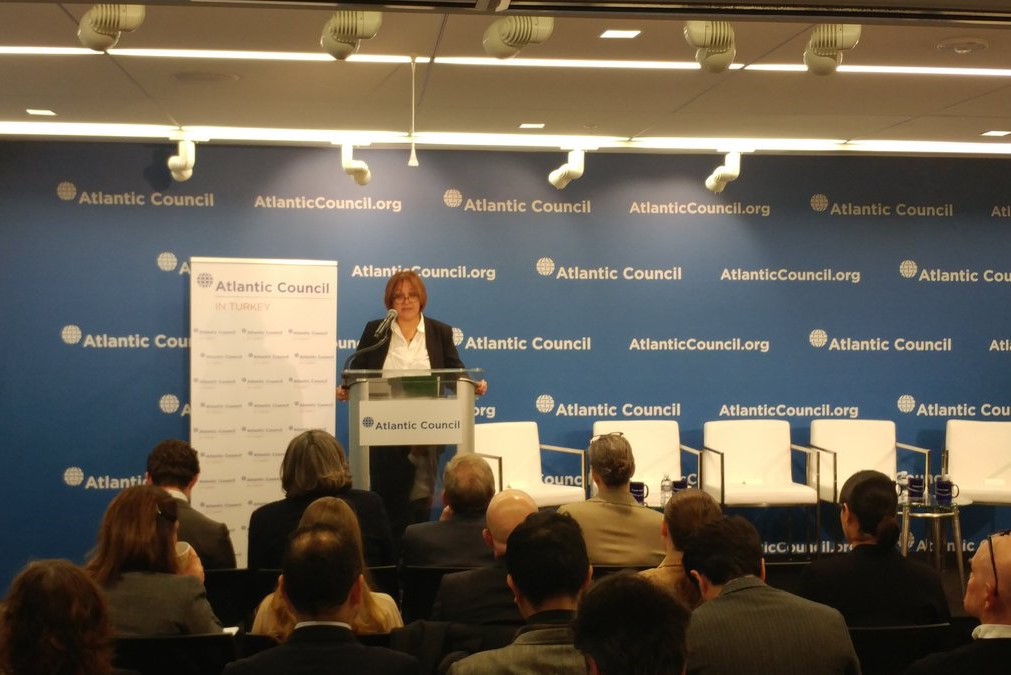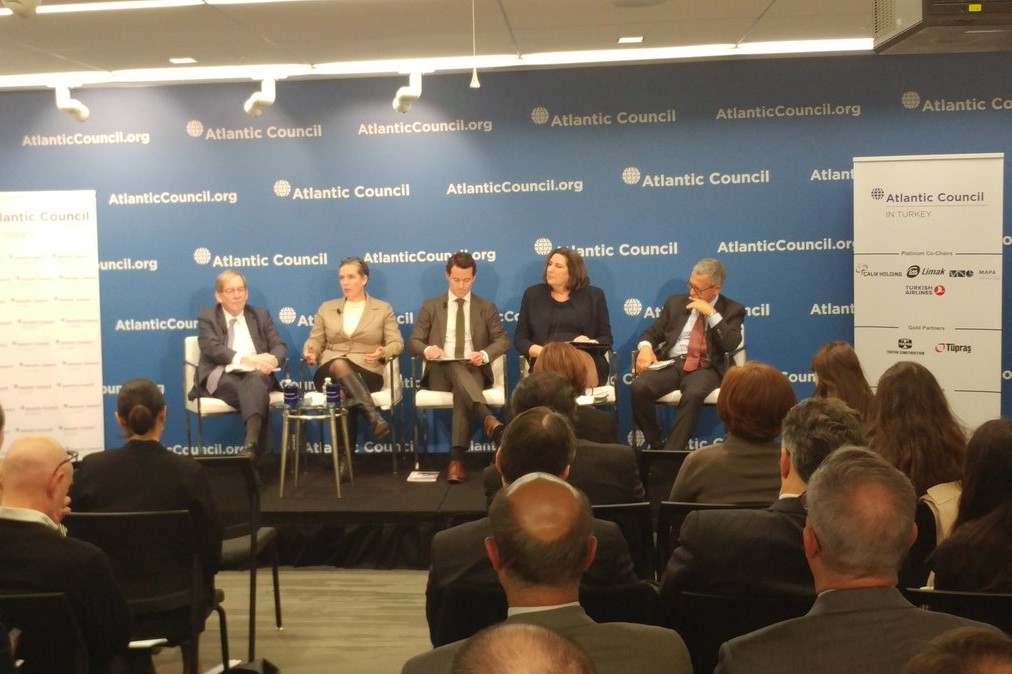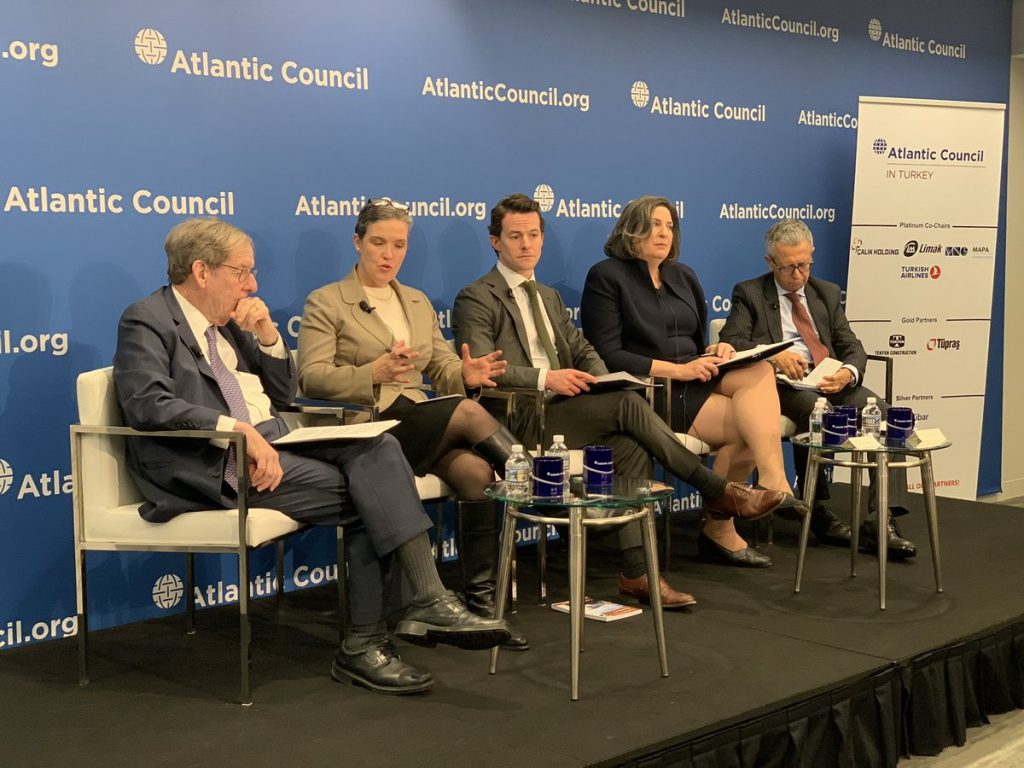On December 6, 2018 the Atlantic Council IN TURKEY, held an event, co-hosted with the Atlantic Council Global Energy Center, in Washington, D.C. to launch a special issue jointly published with Turkish Policy Quarterly (TPQ), on Turkey’s energy sector dynamics entitled “Turkey’s Energy Nexus: Discoveries & Development”.
Atlantic Council Turkey Representative Defne Arslan kicked off the event noting the importance of energy and energy security to Turkey, a country which has few domestic fossil fuel resources of its own and has seen dramatic energy demand growth in recent years. TPQ Editor-in-Chief Süreya Köprülü also contributed opening remarks, welcoming the panel and noting TPQ’s focus on energy issues since its inception.

The panel, moderated by Atlantic Council Global Energy Center Founding Chairman Ambassador Richard L. Morningstar, consisted of US Deputy Assistant Secretary of State Sandra Oudkirk, Turkey’s Former Permanent Representative to the OECD Ambassador Mithat Rende, Atlantic Council Global Energy Center Nonresident Senior Fellow Brenda Shaffer and Atlantic Council Global Energy Center Deputy Director for Climate and Advanced Energy David Livingston.
Sandra Oudkirk spoke about the continuity of US global energy policy, which over several administrations, has continued to prioritize global energy security and availability. One of the major changes in the last few years has been a shifting of focus in regard to the promotion of US energy exports. The shale revolution and transformation of the United States into a fossil fuel producing powerhouse has unlocked the potential of resource export while previously the focus was on the export of energy technology and services.

Ambassador Morningstar underscored the importance of energy in US-Turkey relations, which has remained as a constant and sustaining part of the relationship with broad, bipartisan support despite numerous disagreements in other areas, and pointed to the Southern Gas Corridor as a shining example of cooperation between Turkey, the US and other parties. Speaking on the Southern Gas Corridor, Sandra Oudkirk argued that beauty of the project lies in the eye of the beholder. For Europeans, it brings a new source of non-Russian natural gas to the market, for Caspian producers, it presents a way to sell gas to a market that pays on time and in cash, and for Turkey it is proof of the country’s potential as a conduit and bridge for gas while at the same time bringing a substantial amount of gas to domestic consumers. Oudkirk argued that the United States sees benefits from all three dimensions.
Brenda Shaffer discussed the natural gas landscape of the Eastern Mediterranean which presents a remarkable opportunity for a region rife with conflict. Shaffer argued that while energy diplomacy can be a useful tool, its role should not be exaggerated. Energy linkages can support but not create peace according to Shaffer. Despite her reservations, Shaffer said that the main obstacle to exporting Israeli gas via pipeline to Europe, through Turkey, is economic rather than political. The gas, which would necessarily be exported via a deep water pipeline would find it difficult to compete with cheap Russian, Azeri and Iranian gas.

David Livingston spoke about the remarkable potential for renewable energy development in Turkey. Livingston argued that Turkey has prolific wind, solar and geothermal resources as well as a strong strategic imperative, given its heavy reliance on imported fossil fuels, to develop those resources. While Turkey has made great strides in renewable development in recent years, there is still a wealth of opportunities available. Livingston cited a recent study which suggested that if all currently economic renewable projects were developed, the added electricity generation would be sufficient to reduce Turkey’s natural gas imports by 20%.
Ambassador Mithat Rende talked about Turkish energy policy and interests. Rende identified two major components of Turkey’s energy policy; securing energy supply through a diversification of sources and routes and the development and utilization, to the extent possible, of indigenous resources including renewables and coal. Rende also echoed Livingston’s comments on the potential of renewable resources in Turkey and noted the Turkish government’s focus on the issue. Renewable energy forms a vital part of Turkey’s energy basket, which needs further diversification, including through the utilization of nuclear energy argued Rende.
Energy in Turkey is and will remain an important sector with regional implications. The Atlantic Council’s special issue on Turkey’s energy sector in cooperation with TPQ explores and analyzes the future and trends of the sector in addition to its relations with other regional actors.
